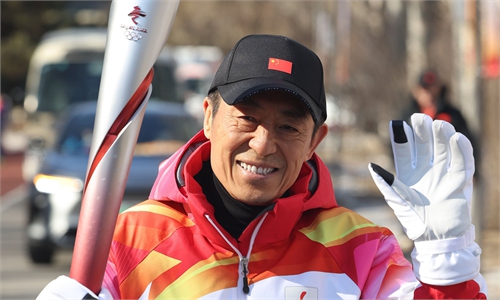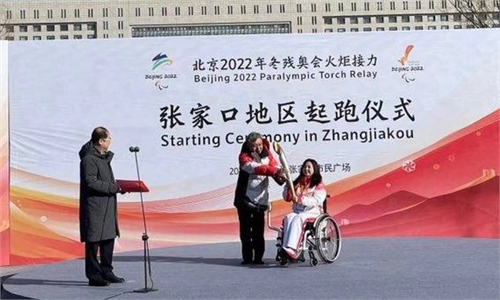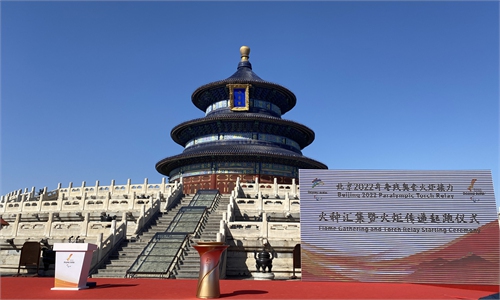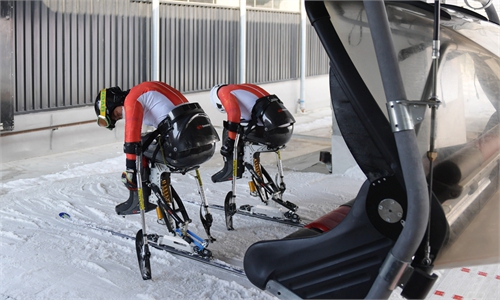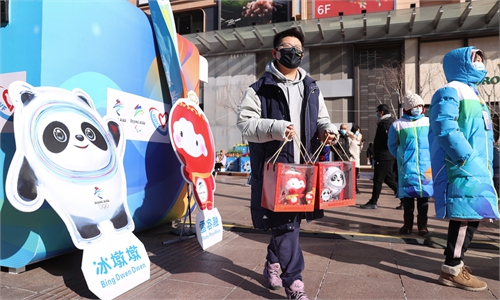Xi to attend Paralympics opening ceremony as nation issues white paper on parasports progress
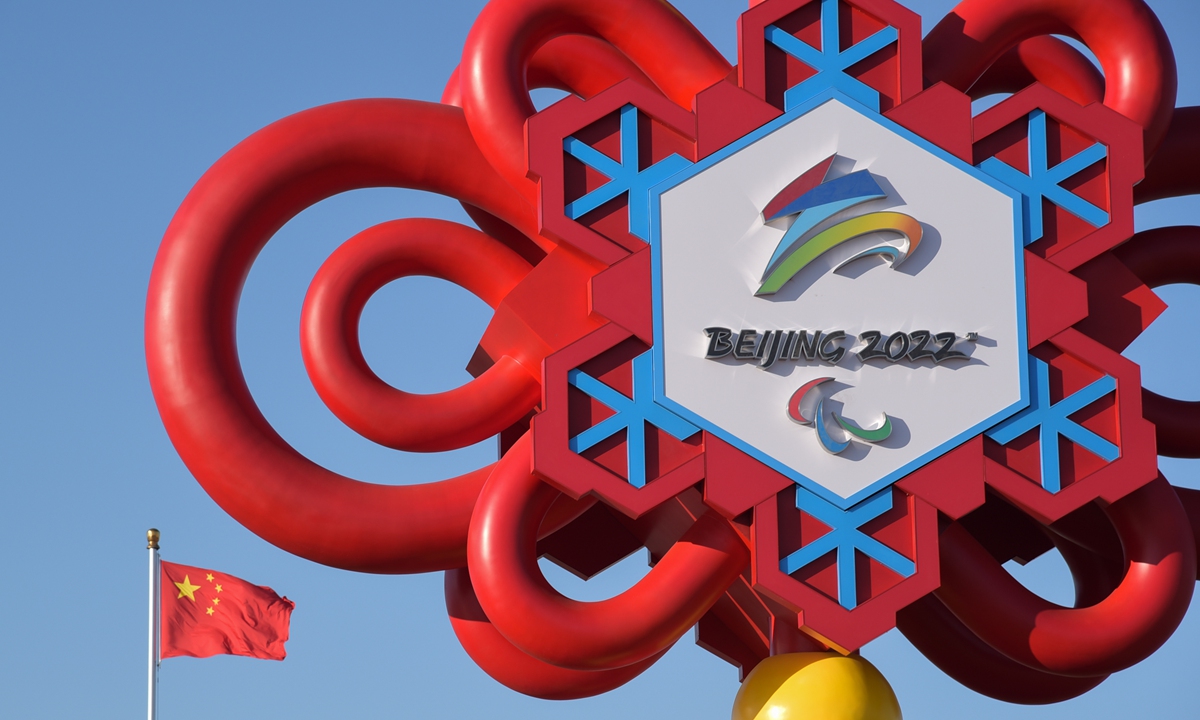
The emblem of the Beijing 2022 Paralympic Winter Games is seen on a flower bed with the theme of "Wonderful Winter Olympics" in Tian'anmen Square, as the cityscape for the Games is set to be completed on February 28, 2022. Photo: VCG
Chinese President Xi Jinping will attend the opening ceremony of the Beijing 2022 Paralympic Winter Games on Friday when the Bird's Nest welcomes world guests again in a month, and the highly anticipated Winter Paralympics are expected to not only showcase China's parasports progress made through national development, but also marks a new milestone in the country's comprehensive welfare for people with disabilities, experts said.
China on Thursday issued its first white paper on sports participation of people with disabilities, which summarized China's efforts and achievements in developing parasports for the public as well as the competitive parasports.
Lü Yansong, vice minister of the Publicity Department of the Communist Party of China Central Committee, said that parasports mirror the living standards and human rights situation of 85 million people with disabilities in China.
China ensures the disabled enjoy rights in economic, political, social and cultural fields, laying a solid foundation for people with disabilities to participate in sports and social life and achieve comprehensive development, Lü said at a press conference held for the release of the white paper.
One can take a glimpse of the Winter Paralympics preparation to understand the improving welfare for people with disabilities in China.
One-fifth of the bearers of the ongoing torch relay have disabilities and the Paralympics flame was collected from local communities, including a school for the blind and a library of Braille books. Thirty percent of the performers at the opening ceremony of Friday had disabilities. Ninety-six Chinese athletes will compete in 73 events in all six sports, a sharp progress from Sochi 2014 where 10 athletes took part in six events across two sports.
Beyond the Paralympics, China sent disabled athletes to 160 international sporting events, bringing home a total of 1,114 gold medals between 2016 and 2020. In the same period, public parasports also made great progress and many people with disabilities benefited from the national plan of involving 300 million in winter sports after the successful bidding of Beijing 2022.
The progress China made in parasports was summarized in the white paper, entitled "China's Parasports: Progress and the Protection of Rights."
China attaches great importance to the welfare of people with disabilities since the founding of the People's Republic of China, and the cause of parasports quickly developed in the 1980s and saw historic progress since the 18th National Congress of the Communist Party of China in 2012, read the white paper.
Ping Yali, China's first Paralympics gold medalist, felt the progress. Ping, with visual disabilities, won Team China a gold in the 1984 New York Summer Paralympics.
She recalled her first trip to New York nearly four decades ago, when she was impressed by "facilities [for disability assistance and rehabilitation] foreign teams brought with them" when China did not have a rehabilitation center.
But in the 1990s, such centers were established across China and today, the training and supportive conditions for athletes with disabilities "are beyond imagination," Ping said.
Ping was talking about an entire system, which was also included in the white paper: a four-tiered parasports athlete spare-time training system.
The Beijing 2008 Summer Games were a milestone moment. The 2008 Paralympics motto of "transcendence, integration and sharing" reflected China's contribution to the values of the international Paralympic Movement.
The Games also left a rich legacy in sports facilities, urban transport, accessible facilities, and volunteer services that continued to benefit people with disabilities.
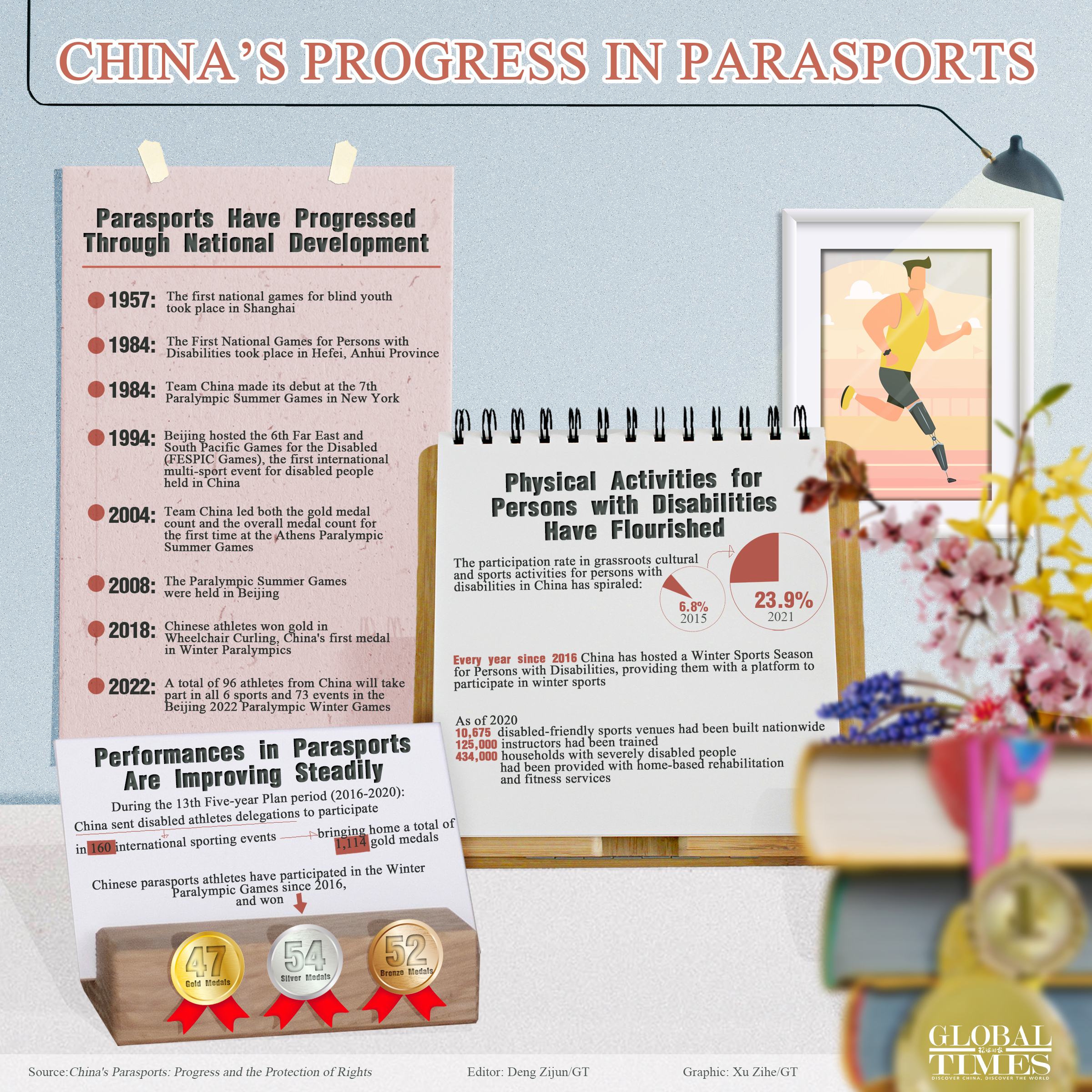
Editor: Deng Zijun/GT Graphic: Xu Zihe/GT
Beyond parasports
Many people still recalled that it was during the years when Beijing was preparing for the 2008 Olympics that accessible facilities were installed in large numbers in the capital city at key public venues such as subways. Other Chinese cities followed suit and significantly enhanced the country's barrier-free level, experts said.
China included barrier-free facilities into a national development plan. So far, 81 percent of entrances and exits, 56 percent of service counters, and 38 percent of toilets at community or village service centers are barrier free. Some 650,000 households that have family members with disabilities were renovated to be barrier-free during the anti-poverty campaign, according to data released at the press conference.
Between the two Paralympics, many new technologies and industries were developed to facilitate the lives of people with disabilities.
Audio reminders on public transport were applied universally, and many smart devices can help people with visual or audio disabilities.
Ping cited the experience of car-hailing. The platform will ask the driver to get prepared because she has a guide dog and people with disabilities can file complains online if they are rejected.
Exoskeleton, which will assist two Paralympics torch bearers during the relay, is being applied wider and more people with limb disabilities are expected to benefit from the technology.
A staff with the China Disabled Persons' Federation (CDPF) told the Global Times on Thursday that during the Ninth Five-Year Plan period (1996-2000), 3.78 million assistive devices were provided for the disabled. The number increased to 6.66 million in the 12th Five-Year Plan (2011-15) and further doubled between 2016-20.
Ping also noted a gradual change in social inclusiveness, and most people she encountered are willing to offer help when necessary and the fear of and discrimination against people with disabilities are decreasing.
Experts pointed out that parasports opened a window through which the ultimate goal is to engage people with disabilities to participate in, contribute to, and benefit from the country's social and economic development.
As the white paper said, developing parasports is key to people with disabilities to improve their physical and mental health and achieve all-round development. It provides an opportunity for the public to understand the potential of the disabled, and is of great importance in ensuring people with disabilities can enjoy equal rights, integrate readily into society, and share the fruits of economic and social progress.
Lü said that Chinese efforts make sure no one will be left behind in respecting and protecting human rights. Protecting the rights of people with disabilities and developing parasports are important parts of China's human rights protection cause.
China has established a welfare system that covers people with disabilities, gives the disabled assistance in the anti-poverty campaign, includes them in the National Fitness and Healthy China programs, and enhances public services for them, Lü said.
The country respects and ensures human rights in legislation and judicial procedures, using a series of laws and ordinances to protect the rehabilitation, education and employment of people with disabilities, while having international exchanges in the field to promote the building of a community with a shared future for mankind, the official said.

